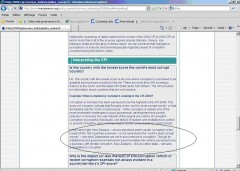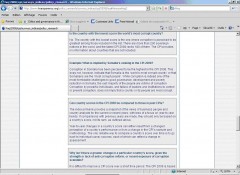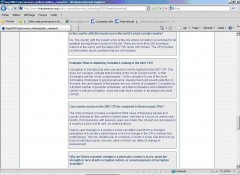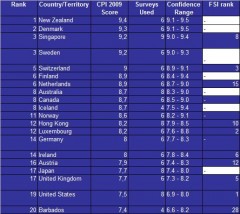11/19/2009
TI implicitly admits in the FAQs that the CPI
I quoted yesterday Dr. Johann Graf Lambsdorff, creator of the Corruption Perceptions Index. He said in an email to the Transparency International network: "It is you, the movement, that will have to start anew to educate TI-S to deliver an acceptable product."
TI published the CPI but with a new paragraph in the FAQs that did not exist the previous years. This paragraph confirms implicitly that the CPI is of no avail and therefore is not an acceptable product.
To answer the question "Is the country with the lowest score the world's most corrupt country?", TI states in 2009 that
No. The country with the lowest score is the one where corruption is perceived to be greatest among those included in the list. There are more than 200 sovereign nations in the world, and the latest CPI 2008 ranks 180 of them. The CPI provides no information about countries that are not included.
Example: What is implied by Somalia’s ranking in the CPI 2008?
Corruption in Somalia has been perceived to be the highest in the CPI 2008. This does not, however, indicate that Somalia is the ‘world’s most corrupt country’ or that Somalians are the ‘most corrupt people’. While corruption is indeed one of the most formidable challenges to good governance, development and poverty reduction in Somalia, the vast majority of the people are victims of corruption. Corruption by powerful individuals, and failure of leaders and institutions to control or prevent corruption, does not imply that a country or its people are most corrupt.
In the same light, New Zealand – whose perceived public sector corruption is the lowest of the 180 countries surveyed – is not necessarily the ‘world’s least corrupt country’ – and New Zealanders are not in turn immune to corruption. Though its institutional and governance framework have translated into what is perceived to be a success, with limited corruption, New Zealand – like any other state – remains susceptible to corruption.
(Click to enlarge)
The Corruption Perception Index is not actually an acceptable product, but TI lays emphasis on the possible misinterpretation like it was the case in Luxembourg: "Gute Noten für das Großherzogtum" (Wort), "Le Luxembourg douzième du peloton des incoruptibles" (L'Essentiel).
By the way, Luxembourg, the only democracy were NGOs were attacked, was ranked N° 2 by TJN for its financial secrecy and however TI states in the press release this year that "Financial secrecy jurisdictions, linked to many countries that top the CPI, severely undermine efforts to tackle corruption and recover stolen assets. Corrupt money must not find safe haven. It is time to put an end to excuses,” said Labelle. “The OECD’s work in this area is welcome, but there must be more bilateral treaties on information exchange to fully end the secrecy regime. At the same time, companies must cease operating in renegade financial centres"
05:39 Posted in General | Permalink | Comments (0)
11/18/2009
Results in UBS case in the USA
The Justice Department and IRS yesterday announced that over 14,700 taxpayers have come forward to report previously-undisclosed foreign bank accounts under the voluntary disclosure program the IRS implemented following the settlement. This figure represents almost double the initial numbers the IRS announced in October and dwarfs the number of voluntary disclosures received in 2008.
However Senator Levin observed that the deal is not so good: the U.S.-Swiss Annex, designed to compel disclosure of the names of U.S persons with Swiss accounts at UBS, is very disappointing as it complicates and muddies what should have been a straightforward agreement by UBS and the Swiss Government to disclose Swiss accounts hidden from the United States by U.S. accountholders.
07:12 Posted in Switzerland | Permalink | Comments (0)
11/17/2009
CPI: Transparency International smells the coffee
Transparency International today published its CPI (Corruption Perception Index).
The press release admits that the CPI is perfectible:
Financial secrecy jurisdictions, linked to many countries that top the CPI, severely undermine efforts to tackle corruption and recover stolen assets. Corrupt money must not find safe haven. It is time to put an end to excuses,” said Labelle. “The OECD’s work in this area is welcome, but there must be more bilateral treaties on information exchange to fully end the secrecy regime. At the same time, companies must cease operating in renegade financial centres.
It was reported in september that Dr. Johann Graf Lambsdorff, creator of the Corruption Perceptions Index, would no longer publish the landmark corruption ranking, he had said in an email to the Transparency International network. Lambsdorff wrote: "It is you, the movement, that will have to start anew to educate TI-S to deliver an acceptable product."
Transparency Indernational smells the coffee with financial secrecy.
60% of the top 20 jurisdictions of the CPI are jurisdiction identified by TJN in the FSI (Financial Secrecy Index) table.
(Click to enlarge)
17:31 Posted in General | Permalink | Comments (0)










